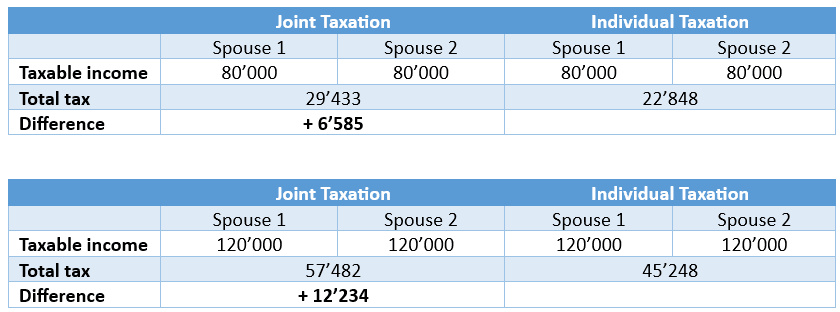The goal of the Individual Taxation is to create a concept of a tax system that is independent of the marital status. Specifically, married individuals facing a higher tax burden under the current system compared to unmarried cohabiting couples (the so-called marriage penalty) are meant to be relieved.
Time schedule
On 30 August 2023, the Federal Council has established the fundamental principles for the introduction of the Individual Taxation. They will prepare the message for the Federal Law on the Individual Taxation which is to be submitted to Parliament by March 2024. The message is intended to serve as a counterproposal to the popular initiative 'For a marital-status-independent individual taxation (Tax Justice Initiative).
Current taxation of married couples: Joint Taxation
According to current legislation and practice, the incomes of married couples is added together. The summing of factors results in a progression effect, which in turn leads to an additional tax burden. Married couples thus pay more taxes than unmarried cohabiting couples. Various measures have been attempted so far to counteract this ”marriage penalty”.
- Married tax rate: special rate for married couples
- Dual-income deduction: when both spouses are employed
Despite the measures described above, the inequality persists, hitting married couples with evenly high incomes the hardest. This shall be shown by the simplified sample calculations below.
These sample calculations apply to childless married couples with dual (employment) income and residency in the municipality of Zurich for the year 2023 (please note that individual tax situations may vary).
Dual-income model

Future taxation: Individual Taxation
By implementing the Individual Taxation, the goal is to eliminate preferential tax treatment for specific family structures and establish a fair, marital -status-independent taxation system. Furthermore, this approach creates incentives to make paid employment worthwhile for both spouses. This, in turn, is intended to counteract the shortage of skilled labour and increase social security contributions. The Individual Taxation is not just a tax reform, but carries the potential for overall economic benefits and contributes to the equality of spouses.
The individual Taxation is intended to be implemented on all levels(i.e. federal, cantonal and communal level), containing the following measures:
- Separate tax declarations: Going forward, married couples will submit their tax declarations in a manner similar to cohabiting couples and singles. The factors are no longer added together. The allocation of income and assets will primarily be based on civil law affiliations.
- Increase in child deductions: To relieve the financial burden on families, child deductions are set to be raised. At the federal level, an increase from CHF 6,600 to CHF 12,000 per child is planned.
- Tax rate adjustments: Tax rates for low and medium income will be reduced, while those for very high incomes will be slightly increased. As a result, the tax rate becomes more progressive.
Criticism
Despite both the initiative and the federal government aim for a tax system that is independent of marital status and living arrangements, it seems unlikely to succeed. There is a risk that couples with a traditional role allocation (where only one person is employed) may face an increased tax burden due to the Individual Taxation.-Singles will not be equally treated, either. While initially a "household deduction" was considered for singles to compensate for their higher living costs, it seems that this has since been cancelled by the Federal Council.
The simplified sample calculations below show the additional burden on couples with a traditional role allocation.
The sample calculations are for childless married couples with one (employment) income and residency in the municipality of Zurich for the year 2023 (please note that individual tax situations may vary).
Sole-income model

Our recommendations
Determining whether the Individual Taxation is advantageous or disadvantageous for you can be achieved through comparison calculations. We are more than happy to perform these calculations for you and to support you with any tax-related matters that may arise during the realisation of your family planning.






